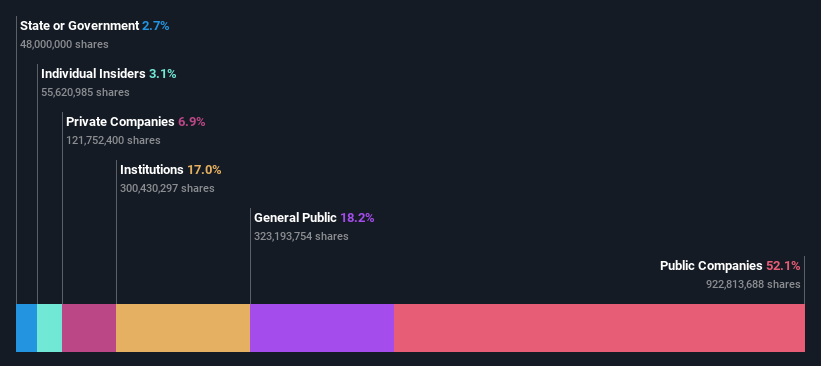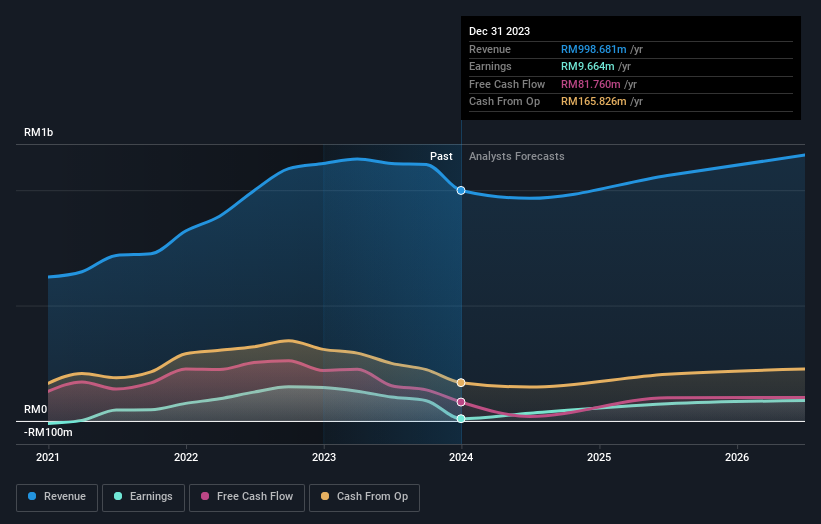While individual investors own 18% of Berjaya Food Berhad (KLSE:BJFOOD), public companies are its largest shareholders with 52% ownership
Key Insights
The considerable ownership by public companies in Berjaya Food Berhad indicates that they collectively have a greater say in management and business strategy
Berjaya Corporation Berhad owns 51% of the company
Every investor in Berjaya Food Berhad (KLSE:BJFOOD) should be aware of the most powerful shareholder groups. And the group that holds the biggest piece of the pie are public companies with 52% ownership. Put another way, the group faces the maximum upside potential (or downside risk).
And individual investors on the other hand have a 18% ownership in the company.
Let's delve deeper into each type of owner of Berjaya Food Berhad, beginning with the chart below.
See our latest analysis for Berjaya Food Berhad
What Does The Institutional Ownership Tell Us About Berjaya Food Berhad?
Many institutions measure their performance against an index that approximates the local market. So they usually pay more attention to companies that are included in major indices.
Berjaya Food Berhad already has institutions on the share registry. Indeed, they own a respectable stake in the company. This implies the analysts working for those institutions have looked at the stock and they like it. But just like anyone else, they could be wrong. It is not uncommon to see a big share price drop if two large institutional investors try to sell out of a stock at the same time. So it is worth checking the past earnings trajectory of Berjaya Food Berhad, (below). Of course, keep in mind that there are other factors to consider, too.
Hedge funds don't have many shares in Berjaya Food Berhad. The company's largest shareholder is Berjaya Corporation Berhad, with ownership of 51%. This essentially means that they have extensive influence, if not outright control, over the future of the corporation. In comparison, the second and third largest shareholders hold about 5.8% and 4.9% of the stock.
While it makes sense to study institutional ownership data for a company, it also makes sense to study analyst sentiments to know which way the wind is blowing. There are plenty of analysts covering the stock, so it might be worth seeing what they are forecasting, too.
Insider Ownership Of Berjaya Food Berhad
While the precise definition of an insider can be subjective, almost everyone considers board members to be insiders. Company management run the business, but the CEO will answer to the board, even if he or she is a member of it.
Most consider insider ownership a positive because it can indicate the board is well aligned with other shareholders. However, on some occasions too much power is concentrated within this group.
We can report that insiders do own shares in Berjaya Food Berhad. In their own names, insiders own RM33m worth of stock in the RM1.0b company. Some would say this shows alignment of interests between shareholders and the board. But it might be worth checking if those insiders have been selling.
General Public Ownership
The general public-- including retail investors -- own 18% stake in the company, and hence can't easily be ignored. While this group can't necessarily call the shots, it can certainly have a real influence on how the company is run.
Private Company Ownership
It seems that Private Companies own 6.9%, of the Berjaya Food Berhad stock. Private companies may be related parties. Sometimes insiders have an interest in a public company through a holding in a private company, rather than in their own capacity as an individual. While it's hard to draw any broad stroke conclusions, it is worth noting as an area for further research.
Public Company Ownership
It appears to us that public companies own 52% of Berjaya Food Berhad. This may be a strategic interest and the two companies may have related business interests. It could be that they have de-merged. This holding is probably worth investigating further.
Next Steps:
It's always worth thinking about the different groups who own shares in a company. But to understand Berjaya Food Berhad better, we need to consider many other factors. For example, we've discovered 3 warning signs for Berjaya Food Berhad (1 makes us a bit uncomfortable!) that you should be aware of before investing here.
Ultimately the future is most important. You can access this free report on analyst forecasts for the company.
NB: Figures in this article are calculated using data from the last twelve months, which refer to the 12-month period ending on the last date of the month the financial statement is dated. This may not be consistent with full year annual report figures.
Have feedback on this article? Concerned about the content? Get in touch with us directly. Alternatively, email editorial-team (at) simplywallst.com.
This article by Simply Wall St is general in nature. We provide commentary based on historical data and analyst forecasts only using an unbiased methodology and our articles are not intended to be financial advice. It does not constitute a recommendation to buy or sell any stock, and does not take account of your objectives, or your financial situation. We aim to bring you long-term focused analysis driven by fundamental data. Note that our analysis may not factor in the latest price-sensitive company announcements or qualitative material. Simply Wall St has no position in any stocks mentioned.


